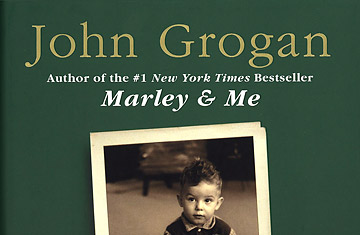
The Longest Trip Home, By John Grogan
The Longest Trip Home
John Grogan
William Morrow, 334 pages
The Gist:
In Marley & Me, John Grogan's hit bestseller about the titular golden Lab who taught him lessons about patience, loyalty, and commitment, the author essentially rewrote Old Yeller. Not so much in its plot or content, but rather in effect—it was a dog book that brought many a grown man to sad, secret tears. (Guys, better get those kleenex out again for this winter's film adaptation.) With The Longest Trip Home, Grogan offers another memoir, this one of his non-dog life: he recalls his childhood in suburban Detroit, growing up in a devout Catholic family; his early years in love; and the agonizing decline of his father's health.
Highlight Reel:
1. On his parents religious faith: "To say my parents were devout Catholics is like saying the sun runs a little hot...One of their earliest dates was Mass followed by a rosary. As a kid hearing my mother tell the story for the umpteenth time, I could only sit, mouth agape, in something approaching mortification, thinking, Oh my God, I have the squarest parents in the universe."
2. After an adult Grogan admits to his parents that he hasn't gone to church for years: "I froze, then turned back. As I did he threw himself against me and buried his face in my shoulder, locking me in a grip so tight it was if he would never let go. I felt him shaking, his chest lurching against me. Then I felt a warm wetness on my neck and heard his sobs, his jagged gasps. The man I had never seen shed a tear, my Rock of Gibraltar, was crying in my arms."
3. On listening to his father explain sex: "I nodded up and down, my mouth agape. If I appeared awestruck, it was not over this anatomical breakthrough but over my father's choice of props. It occurred to me that never before had any father pressed into service a garden hose to demonstrate the act of sexual intercourse. Not birds and bees. Not mating wolves. Not oak trees and acorns. The two ends of a rubber hose. Only my dad."
The Lowdown: There are some who think that memoirs should be exciting, thrilling, full of tragedy or high comedy. John Grogan does not write those kind of memoirs. There are some who think that memoirs should look at the lives of screwed-up folk on their way down (who eventually pick themselves back up) as a way of peeking into a world not our own. John Grogan rejects that proposition outright. His two books operate under the premise that anyone's life is worthy of a memoir, no matter how boring or similar it is to everyone else's. Growing up in suburban Detroit, Grogan lived a solid middle-class life. He was generally a well-behaved child. As a teenager, he dabbled in weed-smoking, and cigarette-smoking, and drank Boone's on occasion, but never committed any major transgressions. He was a good child, brought up by a pair of strict Catholic parents who instilled in him a top-notch moral code. It's a square story through and through. In its story arc, The Longest Trip Home mimics Marley & Me — a life well-lived that requires a death to deliver its message about how to live one's life well. Nothing new here at all, though many readers will see themselves in the book — everyday Joes who win, lose, fight with their parents, and eventually discover their own paths towards happiness. In that, at least, Grogan can take satisfaction in having given the type of insight typically left to fiction writers with far more imaginative tastes.
The Verdict: Skim
